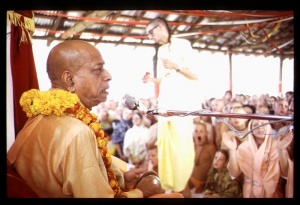SB 6.18.26: Difference between revisions
m (1 revision(s)) |
No edit summary |
||
| Line 1: | Line 1: | ||
{{info | {{info | ||
|speaker=Diti, wife of | |speaker=Diti, wife of Kaśyapa Muni | ||
|listener=Diti wife of | |listener=Diti wife of Kaśyapa Muni thinking to herself | ||
}} | }} | ||
[[Category:Srimad-Bhagavatam - Canto 06 Chapter 18]] | |||
[[Category:Bhagavatam Verses Spoken by Diti, wife of Kasyapa Muni - Vanisource|061826]] | |||
<div style="float:left">'''[[Srimad-Bhagavatam]] - [[SB 6|Sixth Canto]] - [[SB 6.18: Diti Vows to Kill King Indra|Chapter 18: Diti Vows to Kill King Indra]]'''</div> | |||
<div style="float:right">[[File:Go-previous.png|link=SB 6.18.25]] '''[[SB 6.18.25]] - [[SB 6.18.27-28]]''' [[File:Go-next.png|link=SB 6.18.27-28]]</div> | |||
{{RandomImage}} | |||
==== TEXT 26 ==== | ==== TEXT 26 ==== | ||
<div class="verse"> | |||
<div | :āśāsānasya tasyedaṁ | ||
āśāsānasya tasyedaṁ | :dhruvam unnaddha-cetasaḥ | ||
dhruvam unnaddha-cetasaḥ | :mada-śoṣaka indrasya | ||
mada-śoṣaka indrasya | :bhūyād yena suto hi me | ||
bhūyād yena suto hi me | |||
</div> | </div> | ||
| Line 17: | Line 22: | ||
==== SYNONYMS ==== | ==== SYNONYMS ==== | ||
<div class="synonyms"> | |||
<div | ''āśāsānasya''—thinking; ''tasya''—of him; ''idam''—this (body); ''dhruvam''—eternal; ''unnaddha-cetasaḥ''—whose mind is unrestrained; ''mada-śoṣakaḥ''—who can remove the madness; ''indrasya''—of Indra; ''bhūyāt''—may there be; ''yena''—by which; ''sutaḥ''—a son; ''hi''—certainly; ''me''—of me. | ||
</div> | </div> | ||
| Line 25: | Line 29: | ||
==== TRANSLATION ==== | ==== TRANSLATION ==== | ||
<div class="translation"> | |||
<div | |||
Diti thought: Indra considers his body eternal, and thus he has become unrestrained. I therefore wish to have a son who can remove Indra's madness. Let me adopt some means to help me in this. | Diti thought: Indra considers his body eternal, and thus he has become unrestrained. I therefore wish to have a son who can remove Indra's madness. Let me adopt some means to help me in this. | ||
</div> | </div> | ||
| Line 32: | Line 35: | ||
==== PURPORT ==== | ==== PURPORT ==== | ||
<div class="purport"> | |||
One who is in the bodily conception of life is compared in the ''śāstras'' to animals like cows and asses. Diti wanted to punish Indra, who had become like a lower animal. | |||
</div> | |||
<div | <div style="float:right; clear:both;">[[File:Go-previous.png|link=SB 6.18.25]] '''[[SB 6.18.25]] - [[SB 6.18.27-28]]''' [[File:Go-next.png|link=SB 6.18.27-28]]</div> | ||
__NOTOC__ | |||
</div> | __NOEDITSECTION__ | ||
__NOTOC__ | |||
Revision as of 13:49, 14 May 2021

His Divine Grace
A.C. Bhaktivedanta Swami Prabhupada
A.C. Bhaktivedanta Swami Prabhupada
TEXT 26
- āśāsānasya tasyedaṁ
- dhruvam unnaddha-cetasaḥ
- mada-śoṣaka indrasya
- bhūyād yena suto hi me
SYNONYMS
āśāsānasya—thinking; tasya—of him; idam—this (body); dhruvam—eternal; unnaddha-cetasaḥ—whose mind is unrestrained; mada-śoṣakaḥ—who can remove the madness; indrasya—of Indra; bhūyāt—may there be; yena—by which; sutaḥ—a son; hi—certainly; me—of me.
TRANSLATION
Diti thought: Indra considers his body eternal, and thus he has become unrestrained. I therefore wish to have a son who can remove Indra's madness. Let me adopt some means to help me in this.
PURPORT
One who is in the bodily conception of life is compared in the śāstras to animals like cows and asses. Diti wanted to punish Indra, who had become like a lower animal.